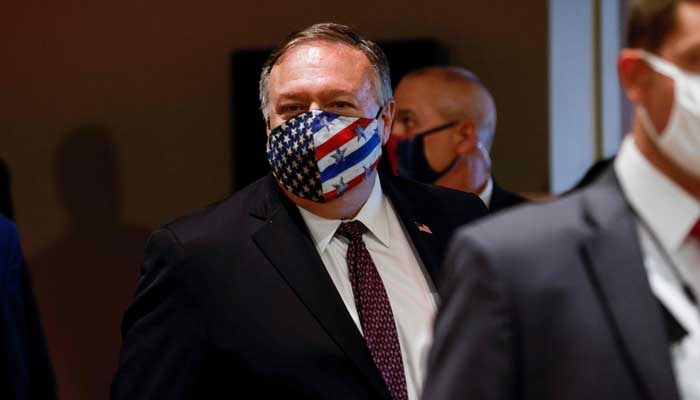
JERUSALEM: US Secretary of State Mike Pompeo arrived in Israel on Monday as part of his five-day Middle East tour, days after the United Arab Emirates announced that they were normalizing ties with Israel.
Pompeo, wearing a mask in the colors of the US flag, will meet Prime Minister Benjamin Netanyahu and will also visit Sudan, Bahrain, and the United Arab Emirates in the coming days, the State Department said.
Washington and its close ally Israel hope that the Jewish state can soon normalize ties with other countries in the region, including several that share its deep animosity with Iran.
In Jerusalem, Pompeo and Netanyahu were to discuss "regional security issues related to Iran's malicious influence" and "establish and deepen Israel's relations in the region," the State Department said.
Netanyahu said Sunday that he and Pompeo would talk about "expanding the circle of peace in our region ... We are working for peace with more countries, and I believe there will be more countries, and in the not too distant future." "
Israel had previously only signed peace treaties with Egypt and Jordan, which unlike the United Arab Emirates share borders with Israel and had technically been at war with the Jewish state.
President Donald Trump's Middle East peace plan, announced in January, provides for cooperation between Israel and those Arab countries that, like Israel, see Iran as their main enemy and accuse it of fueling regional conflicts.
The pro-Netanyahu daily Israel Hayom said on Sunday that direct talks with the United Arab Emirates on the drafting of the agreement were close to the beginning and that "a full agreement could be reached in a month" with a signature at the White House.
Bahrain, Oman, Sudan?
Under the US-negotiated deal announced on August 13, Israel vowed to suspend its previous plans to annex parts of the occupied West Bank, without saying for how long.
The Palestinians have criticized the UAE's move as a "stab in the back", while their own conflict with the Jewish state remains unresolved.
The UAE ambassador to Washington, writing in the Israeli newspaper Yediot Aharonot, argued that closer ties would benefit everyone and "help move the region beyond the ugly legacy of hostility and conflict, toward a destination of hope," peace and prosperity ".
The surprise announcement of the pact between Israel and the Emirates sparked speculation about which regional country could be next, with frequent mentions of Bahrain and Sudan, which is turning its back on the era of ousted strongman Omar al-Bashir.
Israel is technically still at war with Sudan, which for years supported hardline Islamist forces.
The State Department said Pompeo will meet with Sudanese Prime Minister Abdalla Hamdok during his tour, to "express his support for the deepening of the relationship between Sudan and Israel."
Pompeo will also meet with Bahrain's Crown Prince Salman bin Hamad Al-Khalifa before meeting with UAE Foreign Minister Abdullah bin Zayed Al-Nahyan to discuss the deal with Israel, he said.
Saudi Arabia, in keeping with decades of policy by most Arab states, has said it will not follow the UAE's lead until Israel has signed a peace agreement with the Palestinians.
F-35 insight
Following their agreement, Israel and the United Arab Emirates say they want to promote trade, especially the sale of Emirati oil to Israel and Israeli technology to the United Arab Emirates, establish direct air connections, and boost tourism.
The key to that plan would be persuading Saudi Arabia to open up its airspace to Israeli commercial airlines.
Netanyahu has denied reports that the deal hinges on the sale of American F-35 stealth fighter jets to the Emirates, saying he opposes such a move as it could reduce Israel's strategic advantage in the region.
"The Emiratis say there was a promise there, the Israelis say no," said Joshua Teitelbaum, a professor in the department of Middle East studies at Bar Ilan University, near Tel Aviv.
Historically, Israel, which has F-35s, has opposed the sale of advanced weaponry to other Middle Eastern states, including Jordan and Egypt with which it has peace treaties.
But Teitelbaum said such objections had been refined in the past, citing the sale of F-15 fighters by the United States to Saudi Arabia.
She told AFP that she believed that "the version obtained by the Arab country is not the absolute latest version. Israel can make certain modifications to the software that allow it to maintain its advantage."
"The Fact of What"













No comments:
Post a Comment
Thank you for your comment.